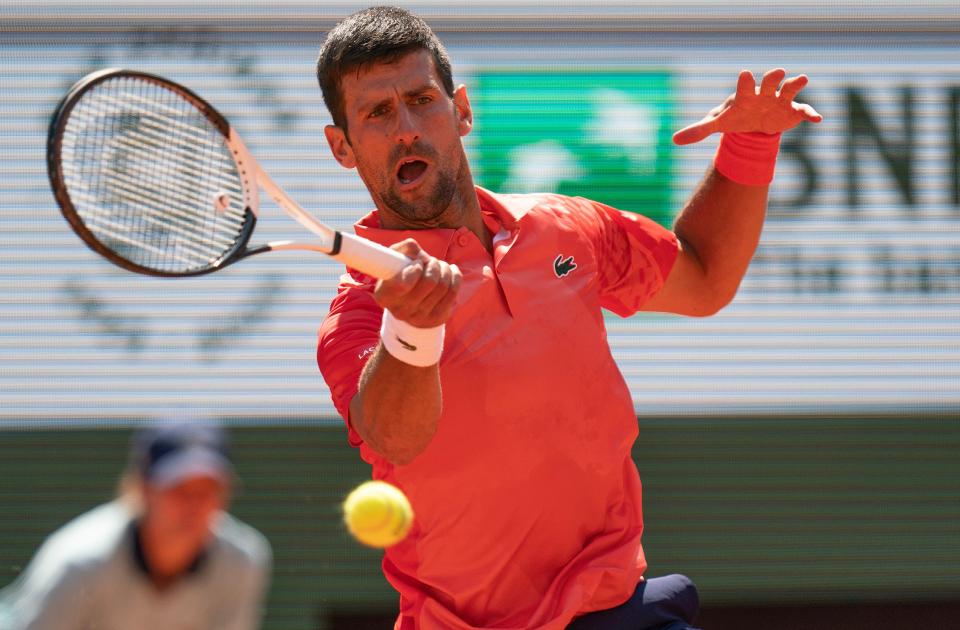Novak Djokovic makes political statement about Kosovo at French Open
It does not appear that Novak Djokovic, who is vying for a record-breaking 23rd Grand Slam title at this year’s French Open, will be sanctioned for a provocative and highly political message sent after he won his opening-round match on Monday.
After beating American Aleksandar Kovacevic in straight sets, Djokovic wrote on a camera lens in Serbian: “Kosovo is the heart of Serbia. Stop the violence.” Winning players typically use the camera lens to send a message to fans or family members, but Djokovic’s note veered toward a highly sensitive topic in the Balkan region and in Europe more broadly as tensions have escalated recently near the border between Kosovo and Serbia.
When asked about it in the Serbian language portion of his news conference, Djokovic — who has family roots in Kosovo — said he had no regrets, even if there was public backlash.
“My stance is clear: I am against wars, violence and any kind of conflict, as I’ve always stated publicly,” Djokovic said, according to a translation by a Serbian journalist working for Tennis Majors. “I empathize with all people, but the situation with Kosovo is a precent in international law…I am very sorry for the situation that we are in - Kosovo is our hearthstone, our stronghold, our most important monasteries are there.”

The French Tennis Federation told Reuters that there were no rules on what players could or could not say and had no further comment.
Here are three things to know about the controversy:
What is the conflict about?
Tensions in the region have simmered for generations between ethnic Albanians, who make up the vast majority of Kosovo’s population, and ethnic Serbs. Kosovo had existed as a semi-autonomous province controlled by Serbia until war broke out in 1998 as a response to Slobodan Milošević, the former leader of Serbia, pulling back that autonomy and embarking on a campaign of repression, displacement and ethnic cleansing of Albanians.
In 1999, NATO forces led by U.S. president Bill Clinton began a 78-day campaign of air strikes against Serbia, an event that Djokovic, then 12 years old, has spoken about frequently as a formative moment in his life and worldview.
After a decade under United Nations administration, Kosovo declared independence in 2008 and its sovereignty has been recognized as such by more than 100 countries, including the U.S., the United Kingdom and most of Europe. Serbia, however, does not recognize Kosovo’s independence, a notion that is echoed in Djokovic calling it “the heart of Serbia.”
What’s going on in Kosovo now?
Skirmishes near the border began anew over the last year due to issues related to documents and license plates of people crossing between the two countries. Tensions escalated even more recently after the ethnic Serbian population in Northern Kosovo, as part of an organized protest, boycotted local elections that ended up with Albanian mayors elected in several towns. Kosovo has used its police force to ensure the installation of those mayors and try to stamp out local protest. In response, Serbia has increased its military readiness.
On May 26, U.S. Secretary of State Anthony Blinken issued a statement condemning Kosovo for having “sharply and unnecessarily escalated tensions, undermining our efforts to help normalize relations between Kosovo and Serbia.” On Monday, approximately 25 NATO peacekeeping forces were injured during a conflict with protestors.
Why is Djokovic’s involvement a big deal?
Though Djokovic’s call for an end to violence is commendable, cloaking it in Serbian nationalist rhetoric during one of the world's biggest sporting events is fairly controversial.
Though it’s not exactly an apples-to-apples comparison, it would be similar to a Russian player declaring Ukraine “the heart of Russia,” a sentiment that would undoubtedly be rebuked by the international community given Russia’s invasion last February and the ongoing war that has resulted.
Djokovic has discussed his views on Kosovo in the past. After the independence declaration in 2008, Djokovic appeared in a video at a protest in Belgrade calling it “one of the worst moments in the history of Serbia.” He also said, “The whole situation is really hard for me because we all know that history of Serbia was written in Kosovo. Kosovo is Serbia. That’s the way it always should be.”
By bringing this issue to the French Open, where Djokovic is attempting to unseat Rafael Nadal as the all-time Grand Slam leader, the Kosovo-Serbia conflict is now a front-burner topic at one of the world’s biggest sporting events. Given Djokovic’s comfort with taking unpopular stances — he’s missed several tournaments over the last two years due to his refusal to be vaccinated against COVID-19 — it’s unlikely this is the last time we’ll hear from him on the topic.
This article originally appeared on USA TODAY: Novak Djokovic makes Kosovo political statement at French Open

